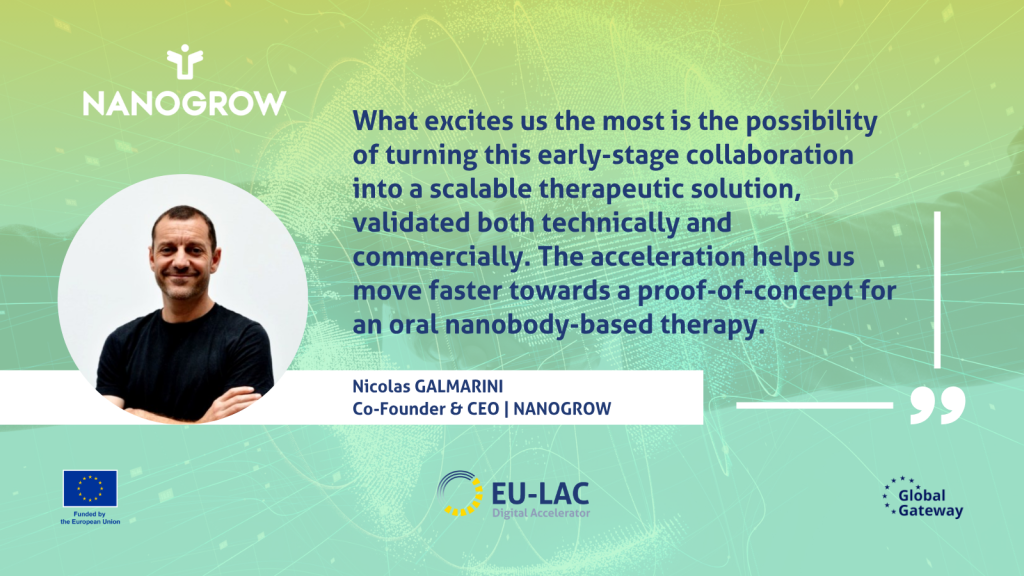Nucaps (Spain) and Nanogrow (Uruguay) are two innovative biotech companies that the EU-LAC Digital Accelerator has recently selected. Together, they embarked on a partnership to develop an oral, localised therapy based on single-domain antibodies for ulcerative colitis.
Ulcerative colitis: a painful disease with limited treatment options
More than 5 million people worldwide suffer from ulcerative colitis[1], a chronic inflammatory disease of the colon that causes abdominal pain, diarrhoea, fatigue, and rectal bleeding.
Despite its impact on quality of life, there is still no cure. Current treatments (such as oral corticosteroids or monoclonal antibodies for severe cases) present significant limitations: low adherence to treatments, severe side effects, high costs, and failure rates of up to 40%, according to available clinical data.
In response to this unmet medical need, Nanogrow and Nucaps, two startups selected by the EU-LAC Digital Accelerator, have joined to develop a new generation of oral biological therapies based on single-domain antibodies (sdAbs) that are safe, effective, and non-invasive.
The joint partnership combines Nanogrow’s innovative sdAb platform (designed to select the best tailored candidate for each disease) with Nucaps’ expertise in nanotechnology encapsulation, enabling optimal oral delivery.
A strong alliance to address a global challenge
For patients living with chronic pain and invasive therapies, this innovation could represent a turning point in how inflammatory bowel diseases are treated.
Nanogrow develops therapies based on Single-domain Antibodies (SdAbs): the smallest, simplest, and most stable known antibodies. Their small size and simplicity improve tissue penetration and bioavailability. These next-generation antibodies are highly versatile and scalable, allowing for targeted, localised formulations, minimising off-target effects. Nanogrow’s platform combines advanced computational tools with experimental science, enabling the discovery and optimisation of tailored SdAbs for specific therapeutic needs.
Nucaps specialises in oral delivery technologies, using natural protein-based nanocapsules to encapsulate sensitive bioactives like SdAbs. Their technology ensures these compounds are protected from degradation during digestion and released precisely in the colon, where the inflammation occurs. This targeted delivery system maximises efficacy, minimises systemic exposure, and offers a non-invasive alternative to injections or complex therapies — improving patient comfort and adherence.
The combination of oral nanoantibodies and targeted encapsulation promises:
- Improved treatment adherence
- Reduced systemic side effects
- Greater therapeutic precision
- Increased accessibility to easy-to-administer biological therapies
The global market for ulcerative colitis reached US$7.3 billion in 2024, with projections surpassing US$10.8 billion by 2030. An effective oral therapy could capture a significant portion of this market, particularly in the early or moderate stages of the disease.
EU-LAC acceleration: beyond science
Thanks to the EU-LAC Digital Accelerator, the partnership received key support services, including:
- Investor pitch refinement (by EBAN)
- Strategic stakeholder mapping of the healthcare ecosystem (by EBN)
- Technical and regulatory roadmapping for preclinical development and European approval (by Octantis)
This support enables the team to move forward with proof-of-concept development in 2025, preclinical studies in 2026, and licensing opportunities by 2027.

Collaborative biotechnology across regions
The partnership between Nanogrow and Nucaps is a prime example of transatlantic cooperation between Latin America and Europe. Through the EU-LAC Digital Accelerator, both companies are advancing the development of solutions that represent not only technical innovation but also real hope for millions of patients around the world.
| You’re a corporate wanting to solve a process or product challenge? |
You’re a startup wanting to validate your solution by partnering with a corporate? |
[1] The Lancet, Ulcerative colitis, 2023,<https://www.thelancet.com/journals/lancet/article/PIIS0140-6736(23)00966-2/abstract>>.














